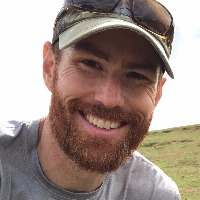 Current Job Title: Structural engineer, sole-member and manager of Dickinson Structural Engineering, Haverford, Pa.
Current Job Title: Structural engineer, sole-member and manager of Dickinson Structural Engineering, Haverford, Pa.
Undergraduate Degree: Chemistry, with biochemistry concentration, Haverford College, 2002
CEE Master’s Program Path: Master of Science (MS) – Structural Engineering & Mechanics, 2008
What do you do at your job?
On a consultant basis, I work for larger structural engineering firms on the east and west coasts of the United States. I provide structural engineering services for typically medium-sized, new and existing building projects and associated site structures. My day-to-day work involves the structural analysis, design, and detailing for a variety of project types including academic, municipal, office, laboratory, hospital, utility, religious, historic, airport, recreational, residential, and others. In addition to my day job, I am proud to serve as a structures specialist for Pennsylvania Task Force 1, part of the National Urban Search & Rescue System.
How did your time at Duke prepare you for your current job?
My experience at Duke prepared me entirely for my career in structural engineering. My path to engineering was atypical in the sense that I did not study engineering for my undergraduate degree. Duke embraced my potential as an engineer and gave me all the tools to be a highly capable and successful engineer. As a graduate student, I took both undergraduate- and graduate-level structural engineering and mechanics courses, while also working on cutting-edge research in structural dynamics and earthquake engineering with Henri Gavin. At the end of my time at Duke, I sat for the Fundamentals of Engineering (FE) exam, which opened the door to professional licensure. I am now a licensed professional engineer (PE) in the Commonwealth of Pennsylvania and a licensed professional civil engineer (PE) and structural engineer (SE) in the State of California.
What was the most valuable part of your Duke experience?
The best and most valuable part of my experience at Duke was undoubtedly the people. Faculty and staff in the Duke Department of Civil and Environmental Engineering represent the best of their fields, and are committed to the well-being and success of the students. In addition to the unwavering support provided by the entire department during my graduate experience, Dr. Gavin has continued to be a mentor to me in my life and my career long after I have left Duke. Furthermore, working with the other graduate students had a profound impact on my quality of life at Duke. For example, Dr. Jessica Saunders, a Duke Civil and Environmental Engineering PhD, has been an influential friend, role model, and mentor to me in my academic and professional career. Without the care and generosity of these individuals, who work tirelessly to make your goals their goals, I would not be where I am today.
What were the most useful courses you took at Duke?
Having not studied engineering while earning my undergraduate degree, as a graduate student I took undergraduate-level math and mechanics courses while simultaneously taking advanced graduate level courses in structural dynamics, finite elements, and steel and concrete design. Every course I took at Duke was critically important to my career, and I honestly cannot think of one that could have been left out. I can only say that I wish I had more time at Duke and could have taken them all.
What advice would you give to someone considering a master’s degree in CEE at Duke?
Soak up the experience. I am for living a balanced life and would not want to suggest that you burn yourself out in graduate school, but the experience is short, and you will likely find yourself wishing you had more time at Duke. So seek out positive interactions, opportunities for learning, and opportunities to share your knowledge and energy with faculty, staff, and your fellow students.
Why did you choose Duke for your master's degree?
My path to engineering wasn't typical, coming to Duke I had no engineering experience. I was working in the emergency management field, both as a EMT and as the director of emergency services for a chapter of the American Red Cross. The work was interesting and very rewarding, but for me personally I wanted my day-to-day efforts to have a more technical/mathematical basis and wanted my contribution to the emergency management field to have more specific technical expertise. After a thorough evaluation, I decided that structural engineering would allow me to work more often on the mitigation side of the emergency management cycle, and at the same time provide this desired day-to-day experience. The faculty and staff at Duke understood the vision I had for my career, believed in my potential as an engineer, and supported my pursuit of these goals. It is a continual balancing act, but between my day job and my role in the urban search and rescue system, I believe I have found the perfect marriage of my interests.